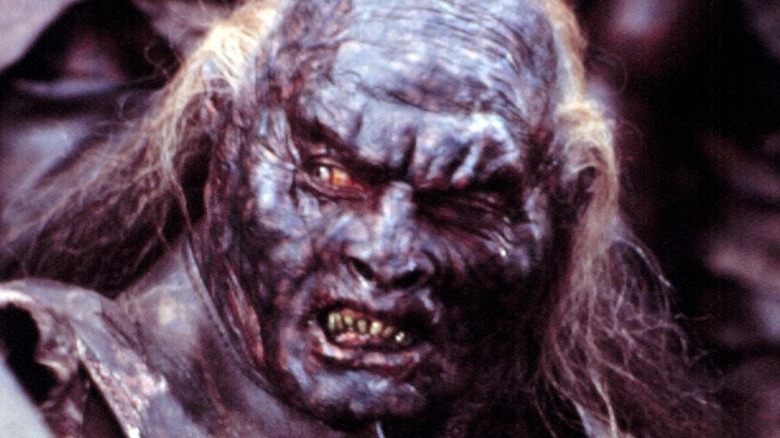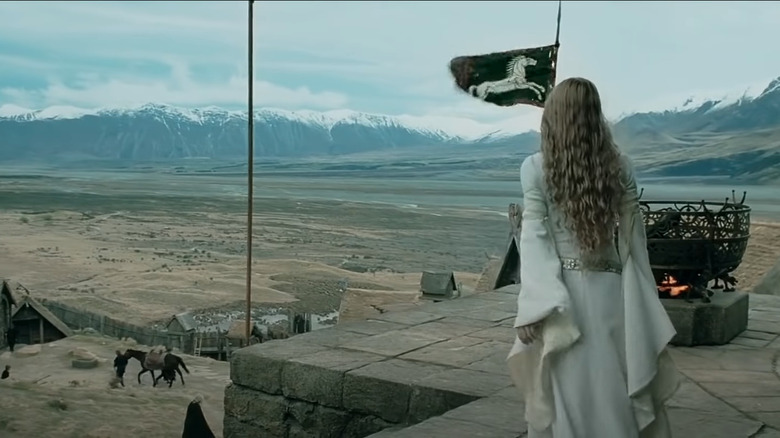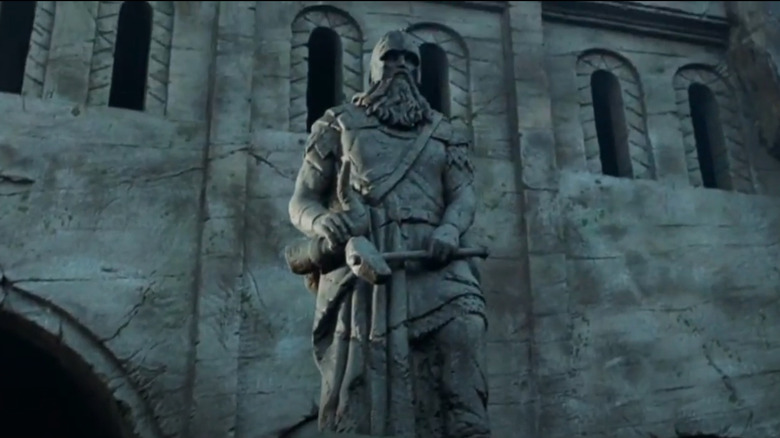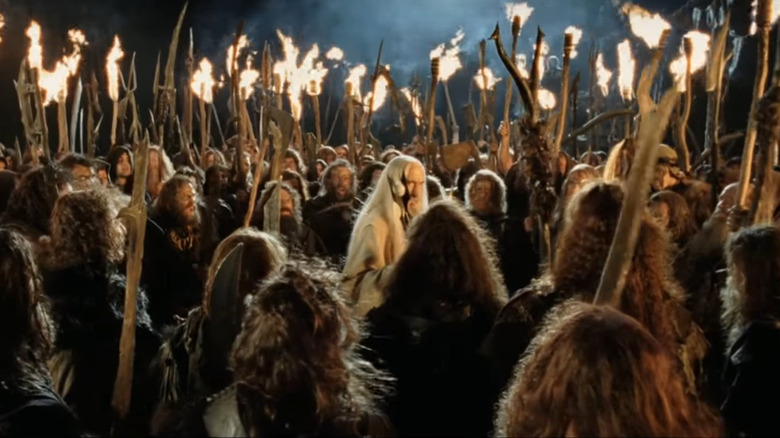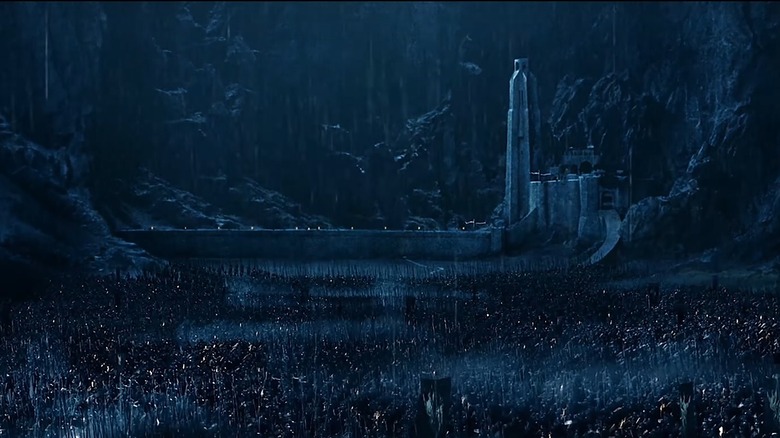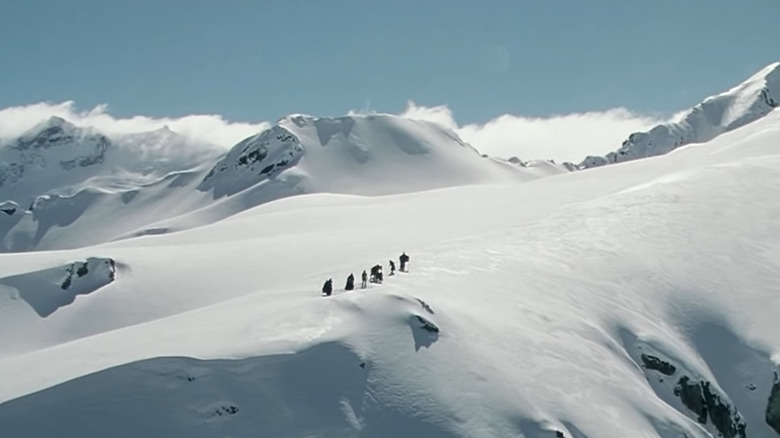What To Expect In The Lord Of The Rings: The War Of The Rohirrim
All eyes have been fixed on Amazon's upcoming Middle-earth adventure for a while now. The ridiculously expensive project has been percolating in production for what seems like ages. While news has been slow regarding that particular Tolkienian project, fans got an unexpectedly pleasant curveball thrown at them in early June 2021 when Deadline released a detailed report about an unrelated upcoming Middle-earth project.
The report deviated attention from the Amazon venture (for the time being, at least) by informing film aficionados and Tolkien nerds alike that New Line Cinema and Warner Animation have teamed up for an upcoming anime film, titled "The Lord of the Rings: The War of the Rohirrim." The announcement was as bizarre as it was unexpected. To what Rohirric rampage was this new project referring?
We can surmise a few things right from the get-go. For instance, Amazon had to pay a pretty penny to get access to Tolkien's Second Age material, so it seemed unlikely that two other studios had stumbled onto the same rights. Besides, the Rohirrim weren't even around at that point. In fact, they don't found their kingdom until roughly five hundred years before the "Lord of the Rings" trilogy. This leaves the story square in the second half of the Third Age.
Fortunately, the Deadline report went into further detail, explaining that the events of the film would specifically focus on Helm Hammerhand, a king of the Rohirrim that waged a desperate fight at none other than Helm's Deep itself (and yes, it's named after him). This narrows the narrative window to a very specific event that takes place less than three centuries before the War of the Ring. That said, here are a few of the things that we can expect to see in the upcoming film.
(Warning: Tolkienverse spoilers ahead!)
We could witness the founding of Rohan
While it won't line up with the primary story, there's a good chance that we'll see how Rohan comes into existence. If the movie is going to focus on the Rohirrim as a whole, they could provide some backstory to set the scene. The Horse-lords' nation starts 250 years before Helm becomes king, when an army of "Northmen" come galloping out of northeastern Middle-earth — that is, roughly from the same region where Beorn the Skin-changer later dwells.
After centuries of migration, this group, led by Eorl the Young, comes roaring out of their homeland and pours into a region of Gondor called Calenardhon. This aggressive ride doesn't take place as an invasion, though. On the contrary, the group of hardy northern warriors rides southeast in response to a call from their Gondorian friends, who will soon suffer defeat by a massive double-invasion of Easterlings from the East and Orcs from the Misty Mountains.
The combined armies of Gondor and the Northmen are able to defeat the Easterlings in battle, and as a reward, the Steward of Gondor gifts the newly liberated region Eorl's people. They settle down, and the nation of Rohan is born. This is what sets up the "we take care of each other" dynamic between the two nations. When we see Théoden wrestling with this old alliance in the "Lord of the Rings" films, he's not debating over a contract or a current commitment to help Gondor if the need arises. He's considering honoring a pact that literally helped to found his country five centuries earlier.
While it isn't an integral part of the Helm's Deep storyline, the founding of Rohan provides some critical background regarding who the Rohirrim are and how Helm comes to be their king two and a half centuries later.
We could get the epic of Helm Hammerhand
Helm is the ninth king of Rohan and one of the most badass kings that the nation ever gets. The dude is specifically called out in the appendix of "The Return of the King," where it introduces him by saying that between Eorl and Théoden, "most is said of Helm Hammerhand," adding that "He was a grim man of great strength."
Helm is the definition of a loose cannon. He's a mighty king that leads his people with confidence and vigor. However, he's also headstrong. Take, for instance, the catalyst that sparks the upcoming "War of the Rohirrim" plot.
At one point, one of Helm's nobles, Freca, wants the king's daughter to marry his son, Wulf. Helm, who already doesn't like the rotund, repugnant aristocrat, takes the fellow outside, where he insults him. Then — get this — he punches him so hard in the face that Freca dies from the wound. The event sets the stage for the conflict that the movie is named after, as Wulf returns a few years later, invading Rohan and overrunning the country with war.
There's no doubt that Freca's death is cold-blooded (even if it isn't clear if Helm was actually trying to kill him). That being said, most of Helm's deeds are of a more heroic nature. The king defends his people from multiple invasions and eventually dies in defense of the fortress that is later named after him. In the process of his last stand, he gains a fearsome reputation, is compared to a snow-troll, and leaves the attacking Orcs quivering in their boots every time they hear him coming. He may not be the most exemplary hero, ethically speaking. But Helm has the potential to translate into an amazing cinematic character — something we'll hopefully get to see play out on the silver screen.
We might (hopefully) get more info on the Dunlendings
The Dunlendings play a minor role in the "Lord of the Rings" trilogy. They show up as the barbaric-looking horde of ruffians that join Saruman's army of Uruk-hai when they invade Rohan (They're the dudes that swear a blood oath to Saruman and are seen raiding across the lands before the Battle of Helm's Deep). It turns out, though, that this isn't the first time the group has run into the Rohirrim. In fact, they join Saruman as part of a feud that goes way back, and it's definitely a major factor during the period covered by The War of the Rohirrim.
See, back when the Rohirrim settle Rohan, they displace a chunk of inhabitants in the northern portion of their new homeland. These unfortunate souls are part of the growing region of Dunland to the north, and the Rohirrim force them to migrate northeast, back to their homeland. There, they live in relative isolation and understandably nurse their grudges, waiting for a chance to get back at their southern neighbors.
When King Helm Hammerhand kills Freca, Tolkien points out that it's rumored that the nobleman has "much Dunlendish blood." The king even calls him a Dunlending in their confrontation — which equates to an insult, considering the bad blood between the two groups.
If New Line and Warner Animation follow Tolkien's original story, the bulk of the movie will probably originate from the Rohirrim's point of view. If that's the case, the Dunlendings will probably factor into the mix as villains. Even if they do, there's plenty of room to humanize them and flesh out more about their culture. At the least, they should go further than Peter Jackson did, which was little more than tossing them into his films as an afterthought.
Helm's Deep will likely be a central location
When Freca is killed, his son and followers are hunted by Helm and they disappear from the map. However, a few years later, both Gondor and Rohan are attacked by different groups at the same time. Seeing their enemies tied up and unable to help one another, the Dunlendings invade — and soon it leaks that Wulf is leading them.
The Rohirrim are unable to stop this surprise invasion. As an equine people with nomadic roots, the Horse-lords don't have too many stone-walled places to defend themselves. The bulk of the Rohirrim flee into the mountains, seeking shelter wherever they can. In the rout, Helm's battered army retreats toward a specific area, where a very familiar stronghold stands. At the time, it's only called the Hornburg, but it's later regularly referred to as Helm's Deep.
With Helm trapped in his mountain stronghold, Wulf rampages across the land. He captures the capital city of Edoras and kills one of Helm's two sons in the fighting. This sets up a scenario where Helm is trapped in Helm's Deep while Wulf sits on his throne, and his soldiers roam freely across the king's lands. Gondor can't help, either, as it's dealing with its own woes once again.
At this point, the rest of the story plays out as an extended siege of Helm's Deep. Helm's other son dies during an expedition to try to get food, and the depressed king takes to leaving his fortress from time to time to stalk through his enemies' camp. In his grief and desperation, he attacks men with his bare hands. In "The Return of the King," it says that he gains a fearsome reputation and that "it was believed that if he bore no weapon no weapon would bite on him," which, yeah, badass.
The Long Winter will definitely impact the story
While being trapped in Helm's Deep is enough to make a good story, there's another factor that will certainly play a part as well: the weather. The War of the Rohirrim will largely take place during an event known as the Long Winter. This five-month freeze bites down hard on friend and foe alike, and the starvation that follows it doesn't do any favors.
It's during this freezing weather that Helm's son dies looking for food, and the gaunt king hunts his enemies dressed in white and stalking around "like a snow-troll," as it says in "The Return of the King." Famine plays such a huge part in the story that the book also says, "The Dunlendings said that if [Helm] could find no food he ate men."
Helm's death is also marked by the cold. Every time the king leaves the fortress, he blasts his horn (the same one that we see Gimli blowing at the end of the "Two Towers" film). Over time, Helm's enemies eventually connect the blowing of the Horn of Helm Hammerhand with the terrifying arrival of the king himself, and literally flee in terror. However, the last time the king heads out to the tune of the horn, he never comes back. When daylight comes, it reveals Helm, alone in the snow, still standing in a frigid yet epic death.
When the snow finally melts after the Long Winter, Helm's nephew, Fréaláf, avenges his uncle, kills Wulf, and reclaims the throne. The melting snow creates huge swampy areas that cause major issues for the invaders, too. Gondor also finally sends help, and the situation is finally resolved. While the third act is exciting, make no mistake: It's the melodramatics of Helm himself that are likely to be front and center as the story unfolds.
